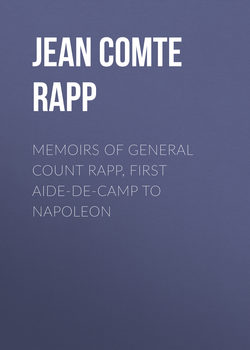Читать книгу Memoirs of General Count Rapp, First aide-de-camp to Napoleon - Jean Comte Rapp - Страница 4
CHAPTER IV
ОглавлениеIt has been affirmed that Napoleon was not brave. A man who, from the rank of lieutenant of artillery, rose to be the ruler of a nation like France, could not surely be deficient in courage. Of this his conduct on the 18th Brumaire, on the 5th Nivose, and during the plot of Arena, are sufficient proofs, if proofs were wanting. He was well aware how numerous were his enemies among the jacobins and the chouans; yet every evening he walked out in the streets of Paris, and mingled with the different groups, never accompanied by more than two individuals. Lannes, Duroc, Bessières, or some of his aides-de-camp usually attended him in these nocturnal excursions. This fact was well known throughout Paris.
The affair of the infernal machine has never been properly understood by the public. The police had intimated to Napoleon that an attempt would be made against his life, and cautioned him not to go out. Madame Bonaparte, Mademoiselle Beauharnais, Madame Murat, Lannes, Bessières, the aide-de-camp on duty, and lieutenant Lebrun, now duke of Placenza, were all assembled in the saloon, while the First Consul was writing in his closet. Haydn's Oratorio was to be performed that evening: the ladies were anxious to hear the music, and we also expressed a wish to that effect. The escort picquet was ordered out; and Lannes requested that Napoleon would join the party. He consented; his carriage was ready, and he took along with him Bessières and the aide-de-camp on duty. I was directed to attend the ladies. Josephine had received a magnificent shawl from Constantinople, and she that evening wore it for the first time. "Allow me to observe, Madame," said I, "that your shawl is not thrown on with your usual elegance." She good humouredly begged that I would fold it after the fashion of the Egyptian ladies. While I was engaged in this operation, we heard Napoleon depart. "Come, sister," said Madame Murat, who was impatient to get to the theatre; "Bonaparte is going." We stepped into the carriage: the First Consul's equipage had already reached the middle of the Place Carrousel. We drove after it; but we had scarcely entered the Place when the machine exploded. Napoleon escaped by a singular chance. Saint-Regent, or his French servant, had stationed himself in the middle of the Rue Nicaise. A grenadier of the escort, supposing he was really what he appeared to be, a water-carrier, gave him a few blows with the flat of his sabre, and drove him off. The cart was turned round, and the machine exploded between the carriages of Napoleon and Josephine. The ladies shrieked on hearing the report; the carriage windows were broken, and Mademoiselle Beauharnais received a slight hurt on her hand. I alighted, and crossed the Rue Nicaise, which was strewed with the bodies of those who had been thrown down, and the fragments of the walls that had been shattered by the explosion. Neither the Consul nor any individual of his suite sustained any serious injury. When I entered the theatre Napoleon was seated in his box, calm and composed, and looking at the audience through his opera-glass. Fouché was beside him. "Josephine," said he, as soon as he observed me. She entered at that moment, and he did not finish his question. "The rascals," said he, very coolly, "wanted to blow me up. Bring me a book of the Oratorio."
The audience soon learned the danger he had escaped, and they saluted him with testimonies of the deepest interest. These, I think, are unequivocal proofs of courage. The men who have followed him on the field of battle, cannot be at a loss to quote many more.
